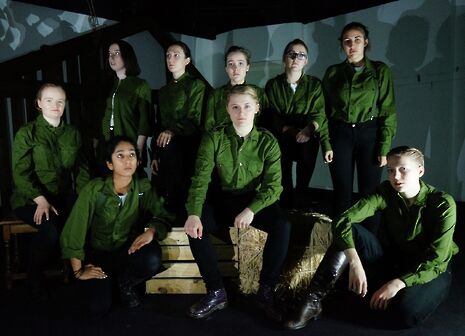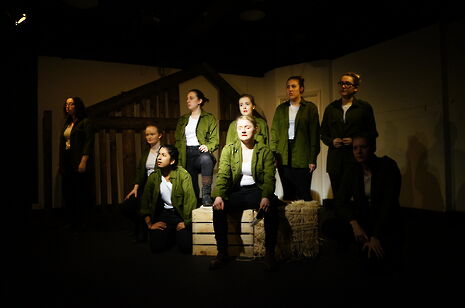Review: Hamp
“Hamp is an unsettling piece – beautiful and brutal in equal measure” writes Rose Aitchison, who deems this week’s Corpus mainshow a gruesome and brilliant exercise in existentialism

Performed 100 years after it is set, the story of the play follows one Private Hamp, who is on trial in a military court in Northern France for cowardice after deserting his battalion following the Battle of Passchendaele. Hamp’s commanding officers find it hard to understand his motivations for deserting his unit, in part because of his unrelenting honesty and lack of ‘artfulness’ in his articulation. He cannot tell a lie and has no desire to even slightly mislead, even to save his own life. As he is reprimanded by a commanding officer, “thinking’s no good, I need to know.”
Played by the physically diminutive Rachel Kitts in a truly moving performance, Hamp’s small, scared voice, overuse of the word ‘sir’ when talking to superior officers which almost amounts to a verbal tic, and cherubic features often lit piercingly from above all contribute to our impression of him as an innocent – a child lost in the trenches searching desperately for home.
The one character who truly comes to understand Hamp as being more than a blank space, as being a real person, who represents the fundamental human desire to be more than a number who is sentenced to death before his trial begins, is the officer who represents him in his court-martial case, Lieutenant Hargreaves, played by Rosanna Suppa. Hargreaves, perhaps rather than Hamp himself, is the existential protagonist of the piece. Through Hamp’s innocence, terror of death and lack of desire to do anyone wrong, Hargreaves comes to realise the sheer horror of the world’s indifference to humanity, especially in the face of the hyper-masculine military and wartime environment.

Hargreaves’s despair at the “tender indifference of the world,” as Albert Camus puts it, and Hamp’s childlike and wondering demeanour, were extremely reminiscent of Camus’s novel The Stranger, famed for its blindingly white prose, which the stark white walls of the Corpus Playroom were perhaps a nod to. Another nice touch of the set was the washing line strung across one side of the stage behind the judge’s bench in the court-martial scene, whose silhouette was eerily mimetic of barbed wire.
“Standout performances by Suppa and Kitts”
The court-martial scene perhaps included another nod to a similar scene in Camus’s novel in the judge’s stupefyingly cruel question to Hargreaves as to whether or not he thinks that he will have finished his defence case for Hamp, who could be facing execution, by lunchtime. This scene was a standout in the piece as a whole, and made effective use of the shape of the Corpus Playroom to transform the audience into the galleries overlooking a trial, with the advocates for both the defence and the prosecution making very direct appeals to the audience in their addresses. This scene created the perfect storm for standout performances by Suppa and Kitts in particular, but also for the other members of the all-female ensemble, almost all of whom appeared in this scene.
The decision to cast the all-male characters with an all-female cast was a bold one, but one which the company definitely carried through well. This helped to distance the audience and the actors from the fact of the characters being men, and allowed for a more fluid and detached exploration of issues of masculinity in a military environment.
Hamp is an unsettling piece - beautiful and brutal in equal measure. Its nod to the existentialist tradition can be summarised in the words of comfort given to Hamp by Shimali de Silva’s Padre: “The worst mistake we make is thinking life is going to be anything but hard and tough”
 News / Fitz students face ‘massive invasion of privacy’ over messy rooms23 April 2024
News / Fitz students face ‘massive invasion of privacy’ over messy rooms23 April 2024 News / Climate activists smash windows of Cambridge Energy Institute22 April 2024
News / Climate activists smash windows of Cambridge Energy Institute22 April 2024 News / Copycat don caught again19 April 2024
News / Copycat don caught again19 April 2024 Comment / Gown vs town? Local investment plans must remember Cambridge is not just a university24 April 2024
Comment / Gown vs town? Local investment plans must remember Cambridge is not just a university24 April 2024 News / Emmanuel College cuts ties with ‘race-realist’ fellow19 April 2024
News / Emmanuel College cuts ties with ‘race-realist’ fellow19 April 2024




